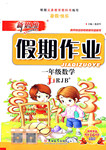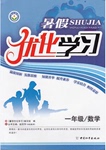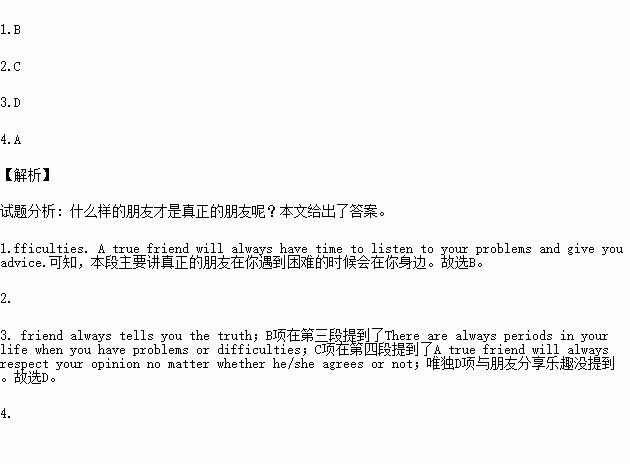题目内容
People all need friends because nobody wants to be lonely and a friend can help you in good and bad times. You’ve made friends since childhood,but you still don’t know who your true friends are. Here are some signs to tell you if your friend is a true friend.
Always honest
Honesty is important to keep a relationship alive. A true friend always tells you the truth. It may be hard sometimes but lying can destroy a friendship. It is important that your friend speaks honestly and never makes up stories.
There are always periods in your life when you have problems or difficulties. A true friend will always have time to listen to your problems and give you advice. It may not be able to offer a solution to your problems but the fact that your friend makes time to listen is a sign he/she cares for you. Your friend is not a true friend if he/she can never make time for you when you are in trouble. You also need to be reasonable and accept that your friend also has other things to do so he/she can’t always listen immediately to your problems.
Always respectful
A true friend will always respect your opinion no matter whether he/she agrees or not. Your true friend may disagree but never insists that he/she is correct.
Always understanding
It is possible that some problems will arise between you and your friend. A true friend will always be forgiving and understanding,even if it isn’t his/her fault. We are all different people and we all make mistakes. A true friend is always forgiving and understanding because he/she doesn’t want to take the risk of losing his/her best friend.
1.What’s the best title for the third paragraph?
A. Keep your secrets B. Always there for you
C. Always happy for you D. Remember your important days
2.According to the passage,a true friend will always ____________.
A. follow your advice
B. offer a solution to your problems
C. respect your opinion even if he/she disagrees with it
D. listen immediately to your problems
3.Which of the following is NOT mentioned in the passage?
A. Never tell lies to friends.
B. Making time for friends.
C. Paying attention to a friend’s opinion.
D. Sharing fun with friends.
4.What’s the author’s purpose of writing this passage?
A. To tell us how to find out if a friend is a true friend.
B. To find out how long a friendship can last.
C. To introduce his experience in making friends.
D. To teach us how to make true friends.
 新思维假期作业暑假吉林大学出版社系列答案
新思维假期作业暑假吉林大学出版社系列答案 蓝天教育暑假优化学习系列答案
蓝天教育暑假优化学习系列答案
